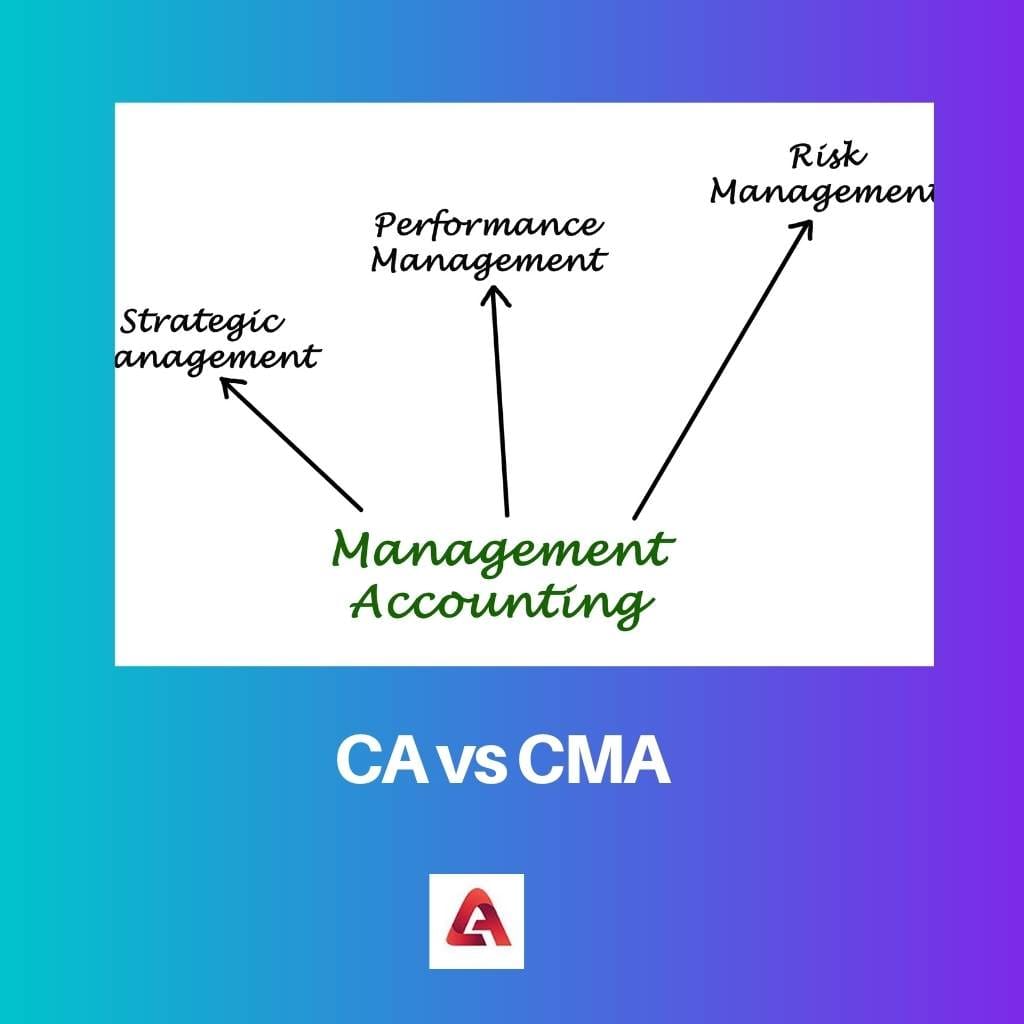Studying plays a vital role in an individual life. Most people dream of studying higher education and settling in the best designations. Education helps individuals reach their goals and settle in the future.
CA and CMA are the higher education courses that an individual pursues after higher-secondary education.
Key Takeaways
- CA (Chartered Accountant) is a professional who specializes in accounting, auditing, and taxation. In contrast, CMA (Cost and Management Accountant) specializes in cost management, financial analysis, and strategy.
- The CA course is administered by the Institute of Chartered Accountants of India (ICAI), while the CMA course is issued by the Institute of Cost Accountants of India (ICAI).
- CA professionals are more in demand for audit and taxation services, while CMA professionals need cost management and financial analysis.
CA vs CMA
CA (Chartered Accountant) is awarded to individuals who have completed the necessary education and training in accounting, auditing, and taxation. CMA (Certified Management Accountant) is awarded to individuals who have completed education and training in management accounting and related subjects.

Chartered Account (CA) is a course that an individual can choose after secondary education. CA course was established in Scotland in 1854 to settle the accounts. The accountants in Scotland have initiated the professional accounting body.
An individual who took up the CA course should focus in-depth. After the CA course, an individual can work in the private sector and manage the jobs like financial reporting, auditing, taxation, forensic accounting, business recovery, accounting processes, and many others.
CA is a hard course where an individual must focus and desire to complete the course. People with passion choose this course.
Certified Management Accountant Course (CMA) is a management course that an individual can choose after secondary education. CMA is similar to CA, where the ultimate aims are different.
CMA is a professional-certified course where an individual can get credentials in the management accounting and financial accounting fields. CMA certificate manifests that an individual gains knowledge in financial planning, analysis, control, decision-making, support, and professional ethics.
Comparison Table
| Parameters of Comparison | CA | CMA |
|---|---|---|
| Meaning | CA is the higher education course chosen by an individual after secondary education. | CMA is a certified course where an individual chooses after secondary education. |
| Abbreviation | Chartered Account (CA) is a managing course in finance. | Certified Management Accountant (CMA) is a certified course in several kinds of management. |
| Established | CA course had established in 1854 in Scotland. | CMA course had established in 1959, May. |
| Course Time | The duration of the CA course is up to 5 years, where an is interested in taxation and accounting subjects. | CMA course had completed in 6 months in the US, where it takes 3-4 years in India. |
| Job | After the CA course, as a Chartered Account, an individual can manage forensic finance, corporate finance, business recovery, taxation, auditing and, an individual can give suggestions, trustworthy information about financial records. | As a Certified Management Accountant, an individual can work as a chairman, managing director, financial control, marketing manager, finance manager, cost manager and many others. |
What is CA?
CA is the higher study course that an individual chooses after secondary education. An individual can take the CA course after pursuing ICAI in the 12th standard. Chartered Account (CA) was chosen by a limited number of people wanting to become financial accountants.
Chartered Account (CA) had established in Scotland in 1854. CA had a professional accounting body that Scotland people had entrenched for accounting purpose.
An individual should focus in-depth on the subject compared to the other courses. As a Chartered Accountant, an individual can advise people about the truths and information of financial records.
The CA course lasts 5 years, and an individual should concentrate on the studies in deep.
The people who are interested in accounting subject choose this course. Once the CA course had completed as a Chartered Accountant, an individual can work in Corporate Finance, Business Recovery, Taxation, Forensic Finance, Auditing, and Financial Reporting.
An individual can acquire knowledge of the finance and marketing courses in CA.
An individual can gain the knowledge skills like high-level strategic skills, helping society, various career choices, playing a responsible role, a visible path for the future, analyzing and solving problems, and demanding their choice by choosing the CA course.

What is CMA?
CMA is a certified professional course established in 1959 by the parliament. Certified Management Accountant (CMA) had chosen by an individual after secondary education. CMA had some similarities compared to CA.
CMA is a professional certificated course where an individual can get credentials in the management accounting and financial accounting fields.
The time for the Certified Management Accountant (CMA) course had 6 months in the US, and the certificate is recognized globally. An individual can complete the CMA course in 3-4 years in India, and the certificate is certified in India.
CMA course is hard to crack where a person should focus on their aims.
Certified Management Accountant (CMA) is a bit easier course when compared to CA. As a Certified Management Accountant, an individual can possess knowledge of financial planning, analysis, control, decision-making, support, and professional ethics.
An individual can grasp management designations in the private and public sectors. After the CMA course, an individual can work as a Managing director, Marketing Manager, Financial Controller, Cost Controller, Chief Financial Officer, Chief Internal Auditor, and many other designations.

Main Differences Between CA and CMA
- CA, known as Chartered Accountant, is a course based on finance and accounts. CMA, a Certified Management Accountant, is a course based on management in accounting and management in financing.
- CA course was established in 1854 in Scotland, whereas CMA was established in May 1959.
- The duration of the CA course had 5 years. On the Other hand, the CMA course can complete in 6 months in the US and 3-4 years in India.
- Both are professional accountant courses, but CMA is a bit easier when compared to the CA course.
- As a Chartered Accountant (CA), an individual can manage forensic finance, corporate finance, and business recovery where, whereas a CMA graduate can work as a managing director, financial controller, or marketing manager.

- https://www.sciencedirect.com/science/article/pii/S1044500500901422
- https://www.tandfonline.com/doi/abs/10.1080/09638180020024070

The relevance of CA and CMA in the accounting and management fields is elucidated comprehensively in this article. It’s imperative for individuals to discern the differences between these courses to make informed career choices.
Absolutely, the article serves as a valuable resource for prospective students and professionals aiming to pursue a career in finance and accounting. The distinction between CA and CMA is effectively articulated.
I couldn’t agree more. The detailed overview of the CA and CMA courses is enlightening, enabling readers to appreciate the unique attributes and career opportunities associated with each qualification.
Indeed, higher education can significantly impact one’s future. Both CA and CMA are important courses that offer valuable knowledge in different areas of accounting and management. It’s interesting to observe the differences between these two fields.
Absolutely, the distinct roles and career paths of CA and CMA professionals are noteworthy. Understanding the nuances of these designations is important for those pursuing a future in finance and accounting.
I agree with your point. The ability to compare and contrast the roles and qualifications of CAs and CMAs makes their significance evident.
This article effectively highlights the essence of CA and CMA courses. The comprehensive comparison table is particularly useful in understanding the differences between these two educational paths for aspiring finance professionals.
Well-stated, Phillips. The thorough analysis of CA and CMA offered in this article is beneficial for individuals evaluating their career prospects in accounting and finance.
I completely agree. The article provides a detailed insight into the distinctions between CA and CMA, emphasizing the importance of these educational pursuits.
The delineation of the roles and responsibilities of CA and CMA professionals in this article is insightful. The distinction between these designations provides aspiring students with clarity regarding their career options within the fields of accounting and management.
Well-articulated, Freddie. The article elucidates the significance of the CA and CMA qualifications, enabling readers to discern the diverse avenues available for career progression in finance and accounting.
Absolutely. The comprehensive overview of CA and CMA qualifications offers an elaborate examination of the unique attributes and professional trajectories associated with each educational pursuit.
The article’s comprehensive comparison of CA and CMA courses offers valuable insights into the diverse opportunities and qualifications available for individuals aspiring to pursue careers in accounting and management.
Absolutely, Megan. The detailed overview of CA and CMA certifications equips readers with a nuanced understanding of the varied career paths and educational trajectories associated with these specialized domains.
The nuances between CA and CMA courses are intriguing. This article effectively showcases the comprehensive scope of these educational paths in accounting and finance, offering valuable insights for aspiring professionals.
Well-said, Charlie. The in-depth analysis of the roles and career prospects of CAs and CMAs fosters a deeper understanding of the intricacies involved in these areas of expertise.
Absolutely, the article provides a thought-provoking comparison between CA and CMA, enhancing readers’ awareness of the diverse opportunities available within the finance and accounting domains.
The comprehensive analysis of CA and CMA courses presented in this article is enlightening. It equips readers with the requisite knowledge to comprehend the roles and responsibilities associated with these specialized domains of accounting and management.
Well-stated, Young. The article provides an insightful analysis of the roles and responsibilities of CAs and CMAs, elucidating the unique attributes and professional trajectories intrinsic to these designations.
Absolutely, Eva. The detailed comparison table fosters a profound understanding of the diverse career opportunities and educational pathways available for aspiring finance professionals seeking to pursue CA and CMA qualifications.
The detailed elucidation of qualities attributed to CA and CMA professionals is enlightening. Aspiring individuals can leverage the information provided here to make informed decisions regarding their career path in finance and accounting.
Precisely, Stephanie. The article’s comprehensive overview of the CA and CMA designations equips readers with pertinent knowledge to navigate their educational and professional aspirations in these fields.
Absolutely. The article effectively dissects the distinguishing features of CA and CMA, providing valuable insights that can aid individuals in understanding the career trajectories associated with each educational qualification.
This article provides a thorough understanding of the intricacies involved in pursuing CA and CMA courses. The comparison table is particularly helpful in gauging the unique attributes of these educational paths within the realm of accounting and finance.
I concur, Holly. The article’s meticulous examination of the CA and CMA qualifications presents an invaluable resource for individuals contemplating a career in the finance and accounting sectors.
Indeed, the article’s insight into the CA and CMA courses facilitates a comprehensive understanding of the specialized roles and responsibilities that accompany these educational pursuits.
The article effectively navigates the distinguishing factors attributed to CA and CMA courses. It aids individuals in evaluating the complex requirements and opportunities tied to these educational paths within accounting and finance.
Precisely. The article’s comprehensive analysis of the CA and CMA courses offers an insightful examination of the unique features and professional opportunities available within the realms of accounting and management.
I agree, Eva. The detailed comparison between CA and CMA certifications enables individuals to discern the distinct attributes and career paths pertaining to each domain.